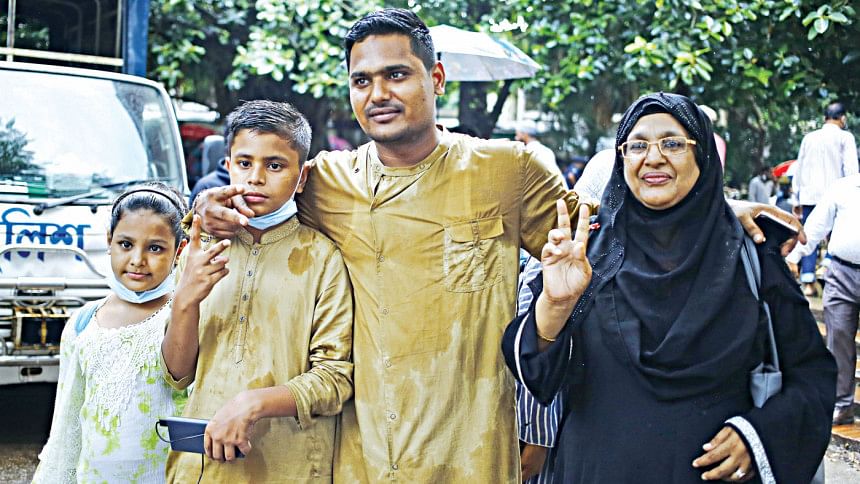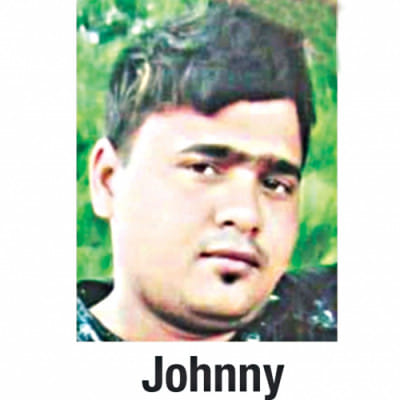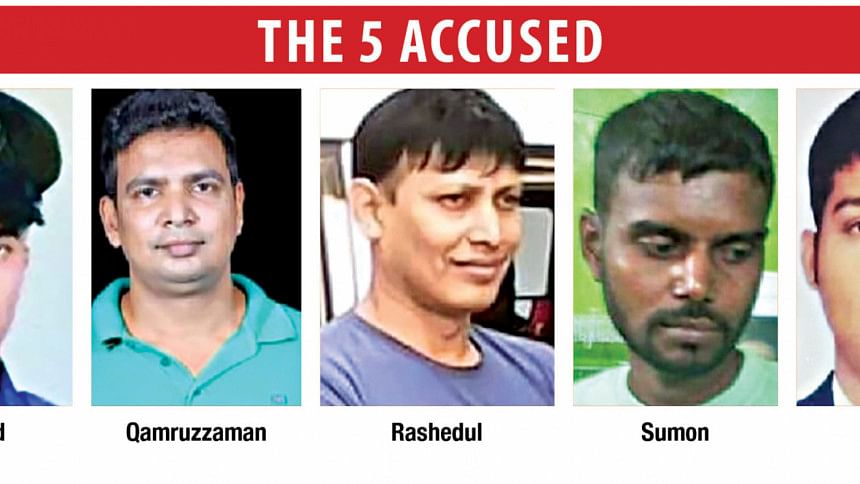Justice catches up with killer cops


Yesterday afternoon before a Dhaka court, Imtiaz Hossain Rocky, brother of Ishtiaque Hossain Jonny who was tortured and killed in police custody in 2014, was constantly on his feet.
He ran from one end of the courtroom to the other to talk to this lawyer, greeted familiar faces to his left and right, gave interviews to all who asked, and even sat down with this journalist to narrate in detail the many harassments he faced. He looked brisk, efficient and sound in dealing with legal proceedings.
But when the judge finished reading out the verdict -- that the three accused policemen will have to serve life sentences -- Rocky stood shell-shocked. A few minutes passed and the courtroom started clearing out, but he just stood there in silence, sobbing.
As everyone prodded him for his reactions, he whispered barely audibly -- "I am satisfied, sir" -- over and over again.
His mother came up to him to comfort her crying son. Even though she too had just received justice for her murdered son, it was Rocky who shouldered the burden of waging a landmark case against the police, and Rocky had just had a historic win.
Justice was served.
It was the first verdict under the Torture and Custodial Death (Prevention) Act, 2013.
Judge KM Emrul Kayesh of Metropolitan Sessions Judges Court sentenced three ex-policemen of the capital's Pallabi Police Station to life imprisonment and two other accused to seven years' in jail in the case filed over the custodial death of Jonny.
The three policemen are former sub-inspector Jahidur Rahman, and former assistant sub-inspectors Qamruzzaman Mintu and Rashedul Islam. The two other sentenced were police informants Sumon and Russell.

Of them, Jahid and Sumon are in jail, Rashed is out on bail while Mintu and Russell are on the run.
"The highest punishment allowed in this law is life sentence -- not death -- and that is what I am pronouncing today," said Judge Kayesh in his observation.
"When custodial torture by law enforcers happens, nobody witnesses it except the victim and the God. This verdict was possible because Jonny's uncles were also detained and were in the same police station cell. They saw the torture happen," said Judge Kayesh.
"We have examined 24 witnesses. Of the accused, only Jahid submitted a self-defence statement, while the rest refused," he added.
On February 7, 2014, a police team led by SI Jahidur picked up Rocky and Jonny from the capital's Pallabi Irani Camp area along with some others from a pre-wedding programme.
They were tortured inside the Pallabi Police Station for around two and a half hours after which Jonny lost consciousness. He was taken to a local clinic, where he died of his injuries.
He was only 28.
Judge Kayesh called the torture by the police "heinous".
As he shared some details of the torture on the brothers with the courtroom, Rocky started to tear up.
"At one point when Jonny asked for some water, Jahid spat on his face and said, 'Here, drink this' … . This is a violation of human rights," observed Judge Kayesh.
The court also fined the three policemen Tk 1 lakh each, in default of which they will have to serve six more months in prison. It also fined the two other convicts Tk 20,000 each, in default of which they will serve three more months in prison.
Besides, the court asked the three police officers to pay Tk 2 lakh each to the plaintiff as compensation.
The trio will have to pay the compensation within 14 days, otherwise they will not be able to file an appeal against the verdict with the High Court.
"I am disposing of this case today after undergoing many ups and downs," observed Judge Kayesh.
"Ups and downs" is the right phrase that describes the ordeal of Rocky, who fought tirelessly for justice for his brother.
His family has constantly been facing threats for the last six and a half years since Jonny was tortured to death.
"The day I filed the case with the court on August 7, 2014, I was threatened. I was on my way back home from the court when I was called up by a local political influential person, who threatened me for daring to file a case against the police," described Rocky. "That was only the beginning."
They were continuously called and approached by accused Rashed and Mintu, who had been out on bail since 2015, claimed Rocky.
Meanwhile, even though Jahid was in jail it came as little comfort for Rocky since his "well-wishers" continued to harass him, he alleged.
"Rashed and Mintu came to my house in July 2017. They offered me Tk 20 lakh to back off, but I did not agree to do that. At this, they threatened me and left," he said, showing an old news clipping of that event as proof.
He also described how he had gone to the police stations of specialised branches and upon going there, found a former investigation officer of the case having lunch with the prime accused.
"The last threat came in 2018. I was going to court to submit some documents when Mintu called me to tell me that this is not going to turn out well for me," recalled Rocky.
In addition to the threats, the legal process itself was tiresome. "I had to show up before court around 450 times [in connection to the case]. There were so many instances when we came to court and then the hearing was postponed for some reason. We felt frustrated. During the early stages, we had to fight just to have our case get accepted," he said.
He finally succeeded in filing a case on August 8, 2014, six months after his brother was killed, with the Metropolitan Sessions Judges Court of Dhaka.
On February 17, 2015, Dhaka Metropolitan Magistrate SM Ashikur Rahman conducted a judicial enquiry, found involvement of Jahid and the four others, and submitted a report to the court.
The court framed charges against the five on April 17, 2016.
Meanwhile, the defendant's lawyer Faruque Ahmed continued to reject the fact that Jonny was killed in police custody. "He died of a heart attack according to medical records. It was a wedding programme with a lot of loud music … loud music can induce heart attacks," he attempted to justify.
He also alleged that Jahid's self-defence statement was taken upon torture. When asked about the many forms of harassment the complainants had faced, he rejected them all. "These are all vague accusations that the complainant brought to gain traction with the media," he said.
He further stated, "The law [Torture and Custodial Death (Prevention) Act, 2013] is not suitable in the context of Bangladesh. It was formulated only to appease international actors. The law will stop the police from doing their jobs."


 For all latest news, follow The Daily Star's Google News channel.
For all latest news, follow The Daily Star's Google News channel. 



Comments